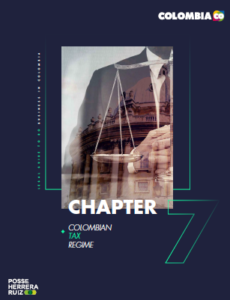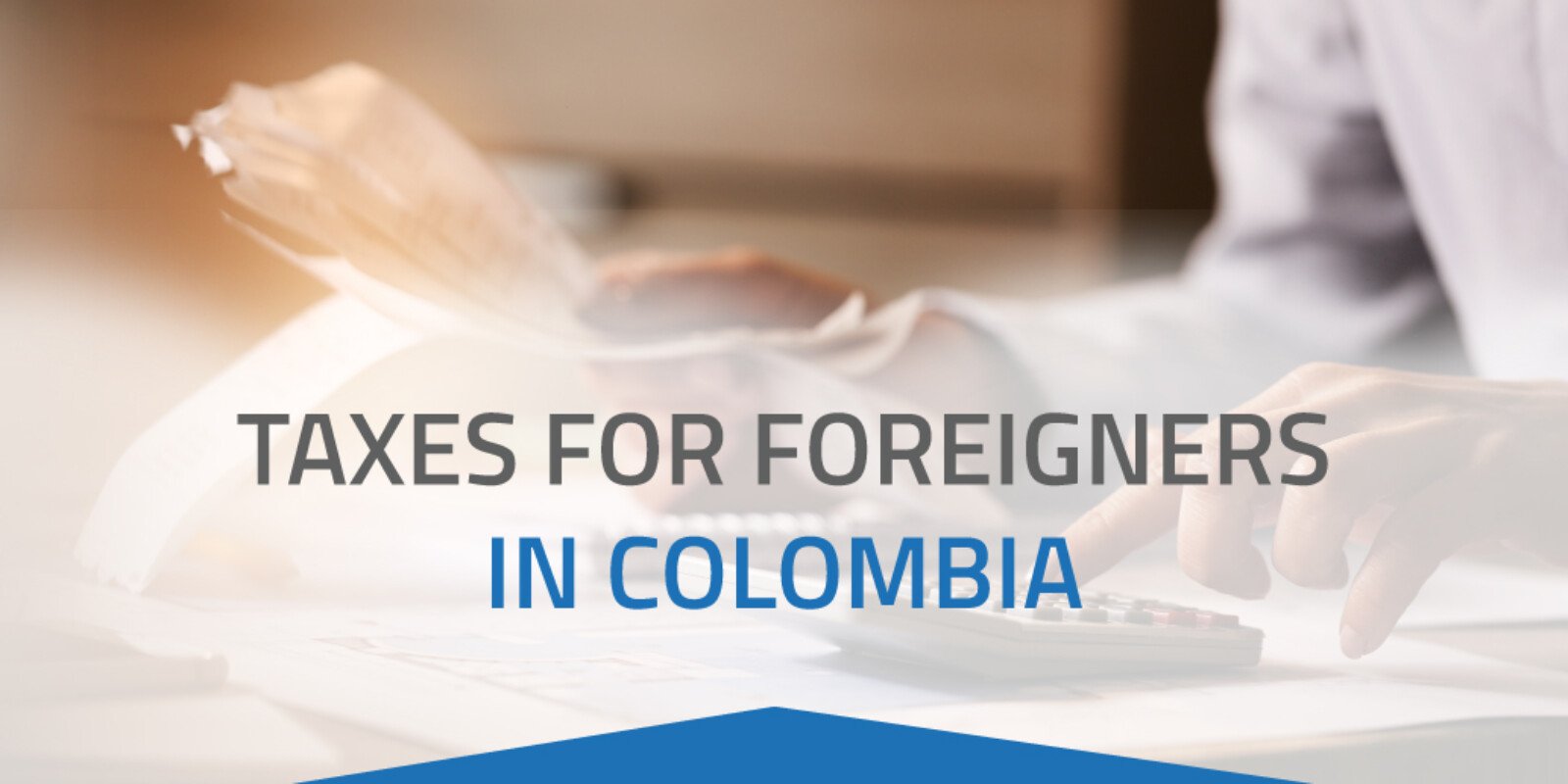Taxes for foreigners in Colombia
It is no surprise that more and more foreigners are choosing Colombia not only as a tourist destination but also as a place to live permanently. This is because, between the hospitality of the people, the enriching culture, the traditional gastronomy, the spectacular landscapes, and the advantage of the dollar exchange rate against the peso, migrating to Colombia becomes a smart decision.
Living in another country is a life-changing decision, so there are essential aspects to consider, such as culture, climate, language, health system, etc. But, there are also regulatory and legal aspects, such as legal stay and foreign taxes.
So, if you choose Colombia as your destination, comply with the current immigration and tax regulations. First, ensure you get a visa that fits your profile, activities, and needs, whether you want to work, study, invest, do business or live indefinitely in Colombia.
Second, make sure you understand the tax compliance system in Colombia as a natural person and comply with the tax legislation as a foreigner in Colombia. It may seem a complex topic. Every day, we receive questions related to taxes from our expat community.
Below, we explain a little about this topic and take the opportunity to solve some of the most frequently asked questions.
Download the official guide on the Colombian tax regime
When am I considered a tax resident in Colombia?
Natural persons are considered residents in Colombia for tax purposes if they meet any of the following conditions:
- Staying continuously or discontinuously in the country for more than 183 calendar days, including days of entry and exit, during any period of 365 consecutive calendar days.
- Persons registered in the Colombian diplomatic service or related to persons registered in the diplomatic service and who, by the Vienna Convention on Diplomatic Relations, are partially or exempt from income tax.
What taxes must I pay if I am a foreigner in Colombia?
A foreigner classified as a tax resident in Colombia must pay income tax on income from national and foreign sources and on assets owned inside and outside the country (real estate property, vehicles, money in banks).
Despite the above, does not mean that the foreigner must necessarily declare the income obtained in countries other than Colombia since there are double taxation treaties and tax discounts for taxes paid abroad, as explained below.
Also, the same rules apply to a foreigner qualified as a tax resident as to nationals concerning the obligation to declare income, so the tops must be considered to be obliged to report income:
For example, if I am a foreign resident and have income from leasing my properties in Colombia, which exceeded $53,206,000 in 2022. In that case, I should declare income in the year 2023 calendar established by the DIAN.
Additionally, when you are a resident of Colombia, It is necessary to file a tax return in addition to the income tax return, and this consists of an informative tax return called «Declaration of Assets Possessed Abroad,»
Henceforth the assets owned outside Colombia (participation in companies, portfolios, and real estate, among others) must be recorded. Still, it does NOT generate any tax to be paid.
However, its omission does cause economic sanctions to be paid by the resident. It must only be filed when the value of the assets held abroad exceeds January 1st of each year, an amount that for the year 2023 is equivalent to $84,824,000.
What taxes do I have to pay if I am a foreigner, NOT a resident of Colombia?
In the case when the foreigner is not a tax resident (only stays in the country continuously or discontinuously for up to 183 days in 365 consecutive calendar days), the foreigner is only obliged to declare the income tax on his income from a national source and the inheritance owned in the country (real estate property, vehicles, money in banks).
As a result, they are taxed on the income obtained in Colombia but not on the income received in other countries, which makes the difference between being a tax resident and not a tax resident.
Those who are not tax residents are subject to the same rules regarding the obligation to file the income tax return (same tops). That is to say, if you, as a tourist in Colombia, exceed some of the previously mentioned tops, you must file an income tax return even if you are a non-resident.
Furthermore, when a non-resident foreigner has one or more permanent establishments or branches in the country (a permanent place of business located in the country where he performs all or part of his activity), he must file a tax declaration for each of those establishments or branches.
For example, Dave works as a digital nomad; during his stay in Colombia as a tourist, he set up a coworking space to work from Colombia, lending the spread to others for their coworking jobs. Although Dave is not a resident, the mere fact of having a permanent establishment obliges him to file income tax returns for his coworking space.
When do I not have to file an income tax return?
Cases in which the foreigner, who is not a resident, complies with the tops to be obliged to file the income tax return, must not file it in the cases in which the withholding at source indicated in Art. 407 to 411 of the ET has been made.
For instance, Sophia is a systems engineer; an important bank hired her to parameterize its security system. Her total fees amounted to $65,000,000; however, the bank withheld the respective withholding tax; therefore, Sophia is not obliged to file income tax returns in Colombia.
Double taxation treaties
If the foreign source income originated in a country with which Colombia has a double taxation treaty, there is no tax to be paid on such foreign source income.
Still, if the foreigner complies with any of the tops or stays in Colombia to declare taxes or be considered a tax resident, they must file the income tax return even if it does not generate tax liability and, if applicable, their declaration of assets held abroad.
What is the difference between paying and declaring income?
Filing is different from paying. You can file your income tax return if you have complied with the requirements set forth above (tops); however, it happens very often, and depending on the particular cases of each person, the return does not necessarily result in a balance to be paid.
What happens if I do not file an income tax return when I am obliged to do so?
If a person does not file their income tax return, they must pay a financial penalty of up to 20% of the value of the bank deposits or gross income.
Nevertheless, if the tax return is filed out of time, that is, after the due date for filing and before the penalty for not filing described above is imposed, the payment of a financial penalty must also be calculated according to the rules defined by law.
It is essential to specify that the value of any tax penalty may never be less than a value equal to 10 UVT, which for the year 2023 is equivalent to $414,120.
New wealth tax
According to Law 2277 of 2022 (tax reform), the following must file estate tax:
- National or foreign resident individuals, illiquid inheritances (a natural person who has died but whose assets have not been awarded to their heirs), taxpayers of income tax, and complementary taxes.
- Individuals, national or foreign, who are not resident in the country, concerning their assets owned directly or indirectly in the country, unless the exceptions provided for in international treaties and domestic law.
- Foreign companies or entities not income tax filers in the country and that own assets located in Colombia other than shares, accounts receivable, and portfolio investments. Excepted from this group are those that sign financial leasing contracts with entities or persons that are residents in Colombia (e.g., leasing contracts).
Glossary of terms
Frequently Asked Questions
1. Are Digital Nomads obliged to pay taxes just for having a visa?
As we explained at the beginning of this blog, you must consider when filing taxes in Colombia whether or not you are a tax resident because it is independent of whether you have a visa.
If you have a digital nomad visa for one year but stay less than 183 days, you would not be considered a tax resident. In this case, you only declare the income tax on national source income and wealth obtained in Colombia.
Otherwise, if, with the visa, you stay for more than 183 days in the country, you declare income tax for the national and foreign source income and patrimony possessed inside and outside the country.
2. Does opening a bank account in Colombia as a foreigner make me pay taxes in Colombia?
Only if it exceeds the top on deposits (1,400) UVT ($53,206,000).
3. If I receive a pension in the USA but I live in Colombia, do I have to pay taxes?
If you are a tax resident in Colombia and a pensioner in the USA or another country abroad. Consequently, you must file your income tax return, and, starting in 2023, the monthly value of your pension will be considered tax-exempt, which means that you will not necessarily have to pay taxes on it.
Check out what you need to know about the Colombian tax regime
At expatgroup.co we understand how important it is to have reliable information. Therefore, we invite you to fill out our form to receive the free official guide to your email.

Why should I use expatgroup.co services?
EXPATGROUP.CO VISA SERVICE
- Includes migratory advisory
- Visa submit and registration
- Registering visa / requesting “Cédula de Extranjería”





Ola,
I will will be social security seconded from Spain by my Spanish employer , and I will owe income tax in Columbia, as confirmed by my Spanish tax advisor.
Do I need a columbian bank account to pay the Columbian tax or can I use my foreign bank account?
Thank you,